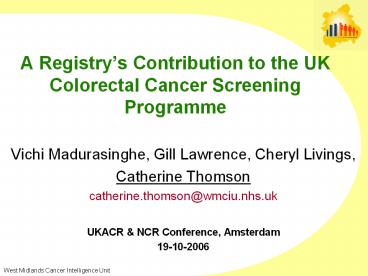A Registry - PowerPoint PPT Presentation
Title: A Registry
1
A Registrys Contribution to the UK Colorectal
Cancer Screening Programme
- Vichi Madurasinghe, Gill Lawrence, Cheryl
Livings, - Catherine Thomson
- catherine.thomson_at_wmciu.nhs.uk
- UKACR NCR Conference, Amsterdam
- 19-10-2006
2
Colorectal cancer incidence and mortality
1979-2004, GB
35,000 new cases in UK each year 5-yr survival
lt50 2nd biggest cancer killer in UK
3
Colorectal cancer age profile 2002 GB
4
Colorectal cancer screening UK
- Randomised trial faecal occult blood testing
(FOBT), Nottingham 1981-1995, ages 45-74 - Randomised trial one-off flexible sigmoidoscopy,
multi-centre 1996-1999, ages 55-64 - Pilot of national screening programmes FOBT, 4
PCTs in West Midlands 3 areas in Scotland, 1st
(prevalence) round 2000-2002 2nd (incidence)
round 2003-2004, ages 50-69 - National bowel cancer screening programme in
England FOBT introduced 2006, ages 60-69 - (Scotland from 2007, but ages 50-74)
5
WMCIU involvement
- Provided data to support follow-up and monitoring
of the colorectal cancer screening studies - Flexible Sigmoidoscopy Trial
- FOBT pilots
- Halo study
- Halo study to investigate suggestion that
introduction of screening programme and
associated publicity may have a knock-on
beneficial effect in non-screening group
6
WMCIU involvement
- Identification of patients diagnosed with
colorectal cancer in the study populations, via
matching techniques - to allow interval cancer rates to be calculated
for screening pilots - to provide comparison of cancer rates and stage
distribution in control and intervention arms in
flexi-sig trial - providing pathology data such as node status,
stage, date of diagnosis, as well as date and
cause of death - Provision and analysis of incidence and mortality
data to examine the effects of the pilots on
trends/stage distributions/age-specific effects
7
Numbers of cases identified by WMCIU matching
results
Based on 1st round of screening, population
invited 09/2000 - 06/2002 With only cancers
diagnosed 09/2000 - 12/2002 of interest Number
invited includes those screened or in
intervention arm, plus those invited for
screening or as controls in the trial
8
Halo study
- Investigate suggestion that introduction of
screening programme and associated publicity may
have a knock-on beneficial effect in
non-screening group - increased colonoscopy activity in non-pilot
groups also - increased awareness of symptoms in all groups
- So does screening influence both target and
non-target populations? - Examine Dukes stage distributions
- Used stage A or B as outcome
- Study examine the impact of the FOBT screening
pilot on symptomatic colorectal cancers diagnosed
- in West Midlands excluding pilot area
9
Stage distribution West Mids 1996-1999 and
2000-2004, ages 50 - 69
Excluding DCO cases cases having neo-adjuvant
trt so invalid stage at diagnosis Again a
beneficial effect of screening seen in Pilot area
when both rounds included (5 change A or B), and
especially when focus on Stage A (8 change)
10
Change in Stage A or B West Mids before to
after pilot, ages 50 - 69
Excluding DCO cases cases having neo-adjuvant
trt so invalid stage at diagnosis Not big stage
shift for males for A and B together (only 2)
larger effect for females (9)
11
Incidence 1980-2004, West Mids,males aged 50-69
Prevalent peak seen for 2000-2002 in pilot area
as anticipated in Halo study but not in Rest of
West Midlands
12
Incidence 1980-2004, West Mids,females aged
50-69
Pattern for women not as expected - reason for
this not yet understood - possibly because of
polyps (5 of pilot cases vs 2 of non-pilot
cases not included in Dukes staging )
13
What next?
- Will exclude the Flexi-sig postcode areas from
the rest groups - Will look at
- numbers of polyps/adenomas identified
- trends in incidence/mortality - all
ages/50-69/70 - Dukes stage and polyp distributions over time
- poisson regression modelling of rates - eg age,
sex, deprivation, ethnicity - Continue collaborative project with Scotland to
compare in more detail the epidemiological
changes due to the two screening programmes
pilots
14
Thanks to
- Vichi Madurasinghe, Gill Lawrence, Cheryl
Livings, - Lou Gonsalves, Stacey Croft, Mike Porter
- at WMCIU and Vicky Hammersley, Edinburgh
University as they have done all the work on
these studies so far!































